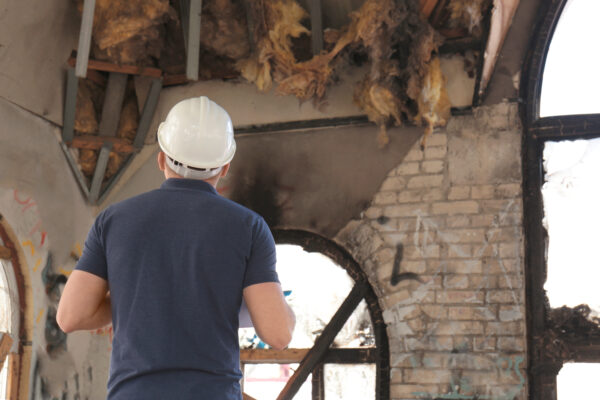Every one of us hopes to never need to make an insurance claim – whether it’s for your health, your vehicle, or your home, insurance is something you always take out hoping you will never need to use it. But the reality is that from time to time you just might, so it’s important to make sure you’re taking out the right policy for you.
Buildings insurance is a necessity for all manner of properties, whether it’s your home, something you rent out, or your place of business. Finding the right buildings insurance can be difficult, however, with so many options and packages available.
This brief guide will explain the basics of what buildings insurance is, the types you will find, and other key things you need to know. This will mean you have a much better chance of finding the right policy for you.

What is buildings insurance?
The first, and most obvious, question is what actually is buildings insurance? It’s simple – it’s an insurance policy designed to protect a building owner/occupier from bearing the brunt of costs associated with negative circumstances involving the building. This could take the form of building damage, a robbery, flooding, etc.
Building insurance policies vary and so the specific items covered will vary – but generally, most policies cover flooding and water damage, fire damage, lightning and storm damage, earthquakes, theft/forced entry, malicious vandalism, heave/landslip/subsidence, animal or vehicle incurred damage, to name a few.
What are the different types of building insurance?
Building insurance policies can generally be categorised in two different ways – property and contents.
Property insurance deals with the actual building itself. So that is anything related to the bricks and mortar, the walls, the roof, the flooring, windows and doors, etc. It will also often cover the static fixtures/fittings like your fitted kitchen or bathroom. Property insurance can simply cover a single house, or it can be extended to include every structure on your “plot” – so garages, greenhouses, sheds, and other outbuildings for example. If you’re unsure as to whether or not your policy covers these, make sure you check before you need to make an insurance claim.
Contents insurance covers the “property within your property” – so your belongings, your valuables, and your personal effects. For most purposes, these are defined as things you would take with you if you moved somewhere news. Think, for example, furniture, TV/stereo equipment, musical instruments, jewellery, consumer electronics, and any collections you may have. Things listed on your contents insurance policy will need to be independently evaluated, and most policies will have a cap on the overall value of the items they are willing to cover on a single policy.
Many insurance packages seek to make things easier for buyers, offering a combination of both property and contents cover as a part of the same policy. In this case, the maximum payout would be your total building cover plus contents cover.
What isn’t covered with buildings insurance?
There are times when your insurer will refuse to pay out on a claim. For example, this can be general wear and tear to the property, or damage that has come about as a result of lack of proper maintenance. Accidental damage is also rarely covered, unless it is explicitly stated as a provision on your policy.
You may have certain responsibilities as a property owner/tenant as a part of your insurance policy. It’s always important to make sure you thoroughly read your policy to understand what is required of you, if anything, before you sign the contract. This will help prevent you from being denied a claim.
Understanding what a policy excess is
An “excess” on a policy is quite simply the amount that you pay personally in the event of a claim. The amount will vary depending on the nature of the claim it covers. It’s important to make sure you’re confident you will always be able to comfortably afford your excess – don’t be tempted to agree to a larger excess in exchange for lower insurance premiums if you’re not totally confident you will always be able to pay it.
Should you get professional advice on your policy?
It’s easier than ever to find different policies thanks to online insurers and comparison tools. But it’s also easier than ever to get overwhelmed by the sheer variety of options available. This is where the assistance of an FCA (Financial Conduct Authority) approved insurance adviser can help. They will be able to help you understand your requirements, filter the available policies open to you, and ensure you understand everything about your policy before you commit to it. It’s a small investment if it means getting the best insurance policy for your needs – so it’s always recommended.
What if you need to make a claim?
Presuming your policy is active and hasn’t lapsed, the first thing to do is contact your insurer. They will take you through the process required to get your claim started. If your claim involves a criminal element you must call the police and get yourself a crime reference number to use with your claim.
To manage the progress of your claim you can commission an assessor to help you put together the details of your claim. Professional help is a small investment if it means an improved chance of your claim being successful, so you should always strongly consider finding FCA approved assistance.
Information is a key element of every claim. Keep all documentation close to hand. If damage is involved make sure you have clear, date-stamped photographs of the damage before and after the event took place. For any contents you’re claiming for you must have receipts or details of your approved valuations that make up your policy. Be as prepared as possible, and you should have the best chance of making sure that your claim is paid out.
Buildings insurance is essential – but it’s even more essential to know you have the right policy for you, and that you understand exactly what it covers.

